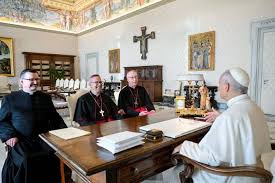Burkina Faso’s military authorities have released three journalists detained earlier this week, though two others remain in custody, in what rights groups describe as an ongoing campaign of intimidation against independent media and civil society voices.
The five were detained by the National Intelligence Agency (ANR) between Monday and Tuesday amid growing tensions between the press and the junta led by Captain Ibrahim Traoré, who seized power in a September 2022 coup.
The journalists released on Wednesday include Zowenmanogo Dieudonné Zoungrana, publishing director of the private daily Aujourd’hui (Today), Ousseni Ilboudo, editorial director of L’Observateur Paalga, and Michel Nana, an independent reporter.
Their respective news outlets confirmed their release, calling it “a relief but not a resolution.”
However, two others — Lamine Traoré, founder of the online platform Burkina Yawana, and Jean-Marie Toé, editor-in-chief of the state-owned daily Sidwaya, remain in ANR custody. Both were reportedly questioned late Tuesday night.
While the junta has not issued an official statement, sources close to the military government hinted that the detentions were linked to an alleged leak of an interview featuring Captain Traoré.
The interview, marking the third anniversary of his coup, was reportedly shared with an outlet critical of the regime before its official broadcast on September 28.
Local analysts believe the move signals internal mistrust and heightened paranoia within the government.
“The government is increasingly wary of information leaks and media narratives it cannot control,” said Issa Nikiema, a political analyst based in Ouagadougou.
“The arrests reflect a wider attempt to consolidate state power through fear and control of the narrative.”
Since Traoré came to power, Burkina Faso has faced mounting accusations of media suppression and human rights violations.
Journalists, civil society leaders, and even relatives of political figures have been detained or forcibly conscripted to the frontlines of the country’s ongoing war against jihadist insurgents.
In the past few months, authorities have reportedly released more than a dozen individuals who were abducted or mobilized without due process — but fresh arrests have continued.
This new wave has reignited fears that the government is using the national security pretext to silence dissent.
The Burkina Faso Journalists’ Association (AJB) and Reporters Without Borders (RSF) condemned the arrests, calling for “an immediate end to harassment and arbitrary detentions targeting media professionals.”
“Journalism is not an act of subversion,” RSF said in a statement. “The detention of reporters for doing their job undermines the rule of law and public trust.”
The media crackdown comes at a time when Burkina Faso is struggling to contain worsening Islamist insurgencies, with more than two million people displaced since 2015.
Captain Traoré’s junta, which came to power promising to restore security and national pride, has instead tightened its control on the press and civil institutions.
Last week, three magistrates from the Appeals Court in Ouagadougou went missing — believed to have been abducted — further deepening concerns about the erosion of judicial independence.
“Burkina Faso is drifting toward a closed society,” warned a diplomat based in the region. “The regime’s legitimacy was built on anti-terrorism rhetoric, but now it is using that to justify everything — even the silencing of journalists.”
Captain Ibrahim Traoré rose to power in September 2022, ousting interim leader Paul-Henri Sandaogo Damiba, in what was the country’s second coup that year.
He was initially hailed by sections of the population for his nationalist stance and anti-French rhetoric. But as insecurity persists and international criticism mounts, his administration has turned increasingly inward, expelling foreign media outlets and detaining local reporters seen as critical.
In April 2024, the junta suspended the BBC and Voice of America over coverage of alleged army abuses. Several local outlets have since been threatened or censored.
As of Thursday, there has been no official confirmation of charges against the two journalists still detained. Civil society groups plan to hold a silent vigil in Ouagadougou calling for their release and reaffirming press freedom as “a cornerstone of the fight against authoritarianism.”
For now, the release of three reporters offers a small reprieve — but for Burkina Faso’s fragile media, the shadow of repression still looms large.



